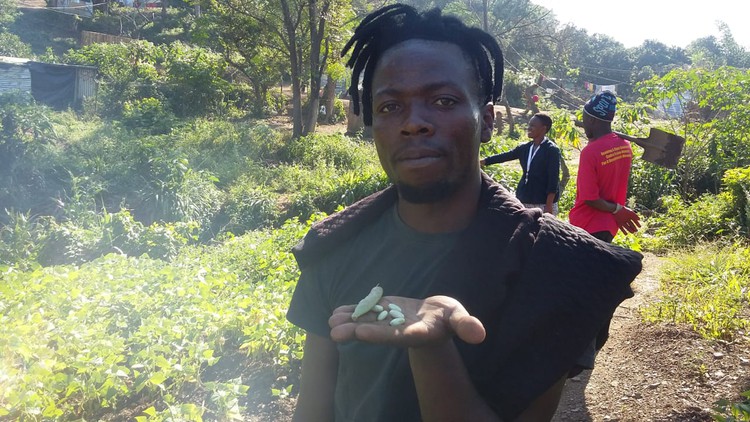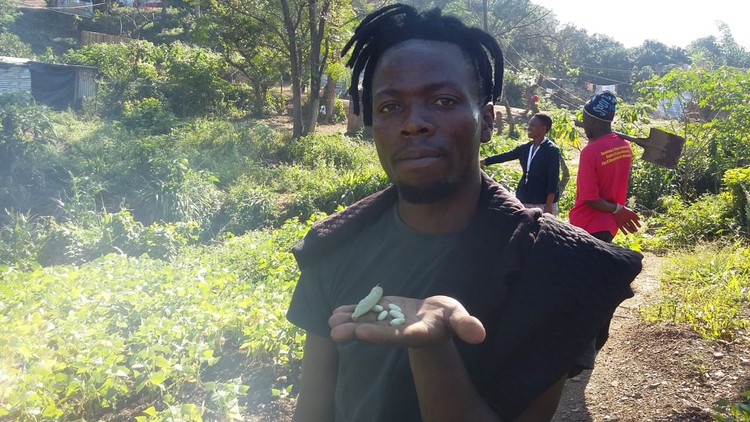
Shack Dwellers’ Vegetable Co-Operative Funds New Toilets, Masks and Sanitisers
Two communal vegetable gardens have made a big difference to life in Khenana informal settlement in Durban, where residents have used the money from sales of spinach and cabbage to buy masks, gloves and sanitisers for everyone during the Covid-19 pandemic. The first garden in the settlement in Cato Crest was started in June last […]

Two communal vegetable gardens have made a big difference to life in Khenana informal settlement in Durban, where residents have used the money from sales of spinach and cabbage to buy masks, gloves and sanitisers for everyone during the Covid-19 pandemic.

The first garden in the settlement in Cato Crest was started in June last year, and since then the money from sales of vegetables has enabled the residents to buy three chemical toilets at R1,500 each, to replace the communal pit toilet they were using, to maintain a tuck shop and to offer money for transport to residents who have to go to town.
Community leader Lindokuhle Mnguni says out of 450 people living in the settlement, about 40% are employed.
“After seeing how many people are struggling to find jobs, we thought it would be best if we started something as a community. We didn’t have any experience or knowledge of running a food garden,” Mnguni says.
With help from Abahlali baseMjondolo, Movimento dos Trabalhadores Rurais Sem Terra in Brazil and Potere al Popolo in Italy, they started with one garden and now they have two. The two gardens are close together and are not fenced. The land belongs to the municipality.
Mnguni says it was hard at first as they struggled to find seeds and didn’t know how to go about planting. “We put our heads together and came up with an idea that worked. We planted spinach and after some time we harvested it and started selling it. People would come to the garden to purchase our produce,” Mnguni says.
At the moment the garden has beans ready for harvest and Mnguni hopes that with the easing of lockdown they will be able to plant a wider range of vegetables and perhaps supply supermarkets with their produce. The tuckshop sells soup, bread, and other food like flour, rice, maize meal, tinned beans and fish. The person who runs the tuck shop is a member of the community who is paid R1,500 a month. At the end of the day, other members of the community help to cash up and count the money for the day.
Mnguni says the co-operative has been making R14,000 from a good harvest, R8,000 if the harvest is not as good. He says the project has inspired many other informal settlements to start their own food gardens.
Residents rotate the work in the garden, with those who have jobs working in the garden during weekends. They also rotate the sales. “There are challenges,” Mnguni says. “We lack information and training, if we could have basic training in farming we could go far.”
“We wanted to register our co-operative this year, but due to the lockdown we couldn’t. We wish to apply for funding and maybe we can get assistance with seeds so that we can grow other things besides cabbage, spinach and beans.”
He says if people were to start their own food gardens there wouldn’t be anyone going to bed without food. “These gardens have become our livelihood. Whatever we do, we do it together and every decision made is for the benefit of this community.”
Resident and financial officer of the co-op Andile Ngcobo says the money from the sales of vegetables “makes a huge difference to the lives of people living in this settlement”. “We need all the assistance that we can get to help us learn more about farming if we want to grow.”
During lockdown, they have used R4,000 from their sales to buy masks, gloves and sanitisers for all residents. “If we hadn’t had money saved up for emergencies, I don’t know what we could have done. Many of our residents are unemployed, they can’t afford to buy these things,” Ngcobo says.
Published originally on GroundUp / © 2020 GroundUp.
